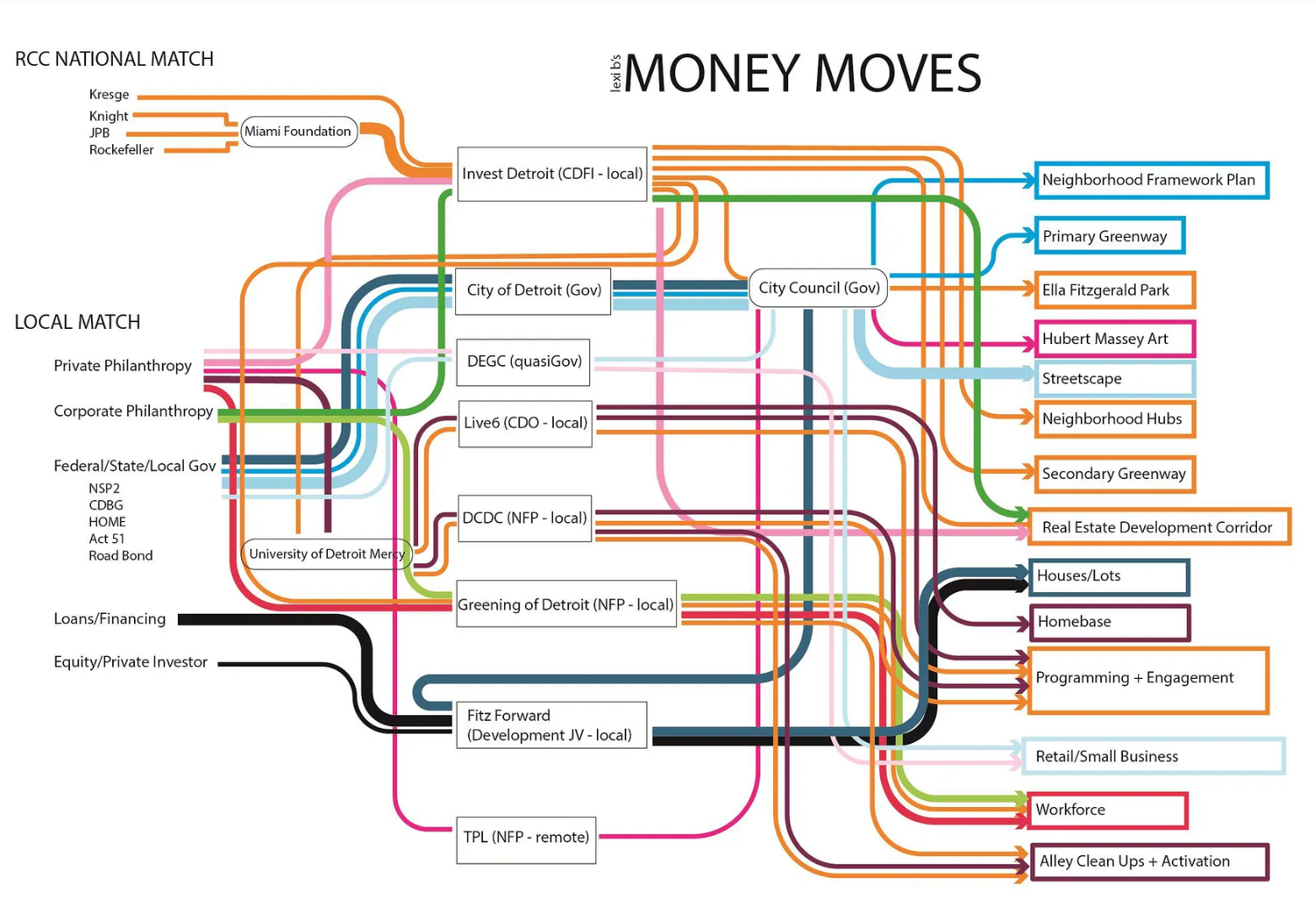Planning Through Uncertainty: Lessons from Detroit

2025 has been a challenging year for many planners. Federal policy changes, program cancellations, and agency firings — many of which are pending as legal challenges play out — may be creating disruption and uncertainty in your community. You may have seen grant funds for planning projects and programs delayed or terminated, leaving you scrambling to fill sudden resource gaps and reeling with questions on how to weather the storm.
Detroit's Recovery Offers Planning Lessons
One city that offers answers is Detroit, which has faced more than its share of disruption and uncertainty. Once the fourth-largest U.S. city with a population of 1.8 million, decades of decline landed it on front pages in 2013 as the largest municipal bankruptcy in U.S. history. But things are turning around. The downtown has seen billions of dollars in commercial and residential reinvestment, high-profile events such as the 2024 NFL Draft have brought millions in economic returns, and the city has gained population for the first time since the 1950s. Underpinning these gains, however, has been the grinding work of fighting back from the bottom with scarce resources in hard times.
Alexa Bush, planning director for the City of Detroit, has experienced this journey firsthand from multiple perspectives — as a city planner, a philanthropic partner, and now as a department leader. In a recent APA Podcast, she shared how planners in Detroit kept on planning — and delivering wins — through those tough post-bankruptcy years. Her reflections offer lessons that all planners can learn from as they face tight budgets and shifting funding streams.
Be Entrepreneurial
Detroit planners learned to braid together a wide mix of resources, evidenced by a diagram Bush drew up to track funding flows for one particular project. It includes federal formula funds like CDBG, state gas tax revenues, bond proceeds, philanthropic support, corporate partnerships, and private investment.

Braiding funding streams in Detroit. Diagram by Alexa Bush.
"We had this very entrepreneurial approach," says Bush. "If our ambition is this, and our resources are that, how do we not let our ambition drop, but really get creative with using tools at our disposal to achieve the vision that we want to have?"
According to Bush, Detroit's planners "became very, very good at solving" this question: "Here's the vision that we think is the best for the neighborhood. How do we match a funding source to best meet that vision?" Staying on top of the different conditions and requirements for each funding source helped planners optimize the funds they had — and recruit the resources they needed from partners. "We developed a campaign where we said, 'This is the public leverage we're going to bring to the project. And here, as a different kind of funder, is where we would really love to have you plug in.' That became a way to structure the conversation."
By mapping which funding sources could be used for which types of projects and proactively tapping key partners to fill gaps, Detroit's planners created a model for leveraging scarce resources that can be replicated in other communities.
Stay Flexible and Opportunistic
Bush emphasizes that planning with uncertainty requires a cultural shift: embracing flexibility, staying nimble, and being willing to rethink projects if the timing isn't right.
"We've always been kind of scrappy about those opportunities," she says. "We've tried to give ourselves room to be opportunistic: Here's the funded list, here's the dream list. How might we need to move things back and forth across those? Are there ways we can break down projects into smaller pieces?"
According to Bush, staying focused on the outcome while being open to how to get there is key. If a plan or a project falls through, "Maybe there's another way to achieve that same outcome, or at least keep making progress in service of that outcome, even if you can't get the whole way there."
When faced with uncertainty, Bush notes the importance of patience: "Give yourself time to see if things play out and change — not giving up on a project right away, but building some comfort with, 'Maybe it's just not right now.'"
This mindset has helped Detroit weather pandemic cost spikes and federal funding shifts, and it can help planners respond to unexpected obstacles or sudden opportunities.
Look Beyond Federal Funding
Detroit's planners found the region's private philanthropic foundations to be a key resource beyond federal grants and state funds. These mission-driven, risk-tolerant partners played an especially critical role.
"Private philanthropy can be some of the people that are first in, in a challenged market or a place that's not seeing investment," Bush notes. And because philanthropic funding is often free of the requirements and limitations set on public monies, planners could strategically plug that funding in wherever it might be needed. Once initial projects got underway, those visible changes could jump-start private-sector investment and corporate funders.
Grassroots empowerment drives community progress
Finally, Bush encourages planners to tap into grassroots resources, citing Detroit's success at working with residents and block clubs. "Are there smaller things that you can get done as a community without other funding sources? It's a different way of working, but I think there's a lot of untapped potential to explore. What can you do just within your own community? And what resources does the community have to move action forward?"
Especially in times of scarcity, empowering the community to lead smaller-scale improvements can keep momentum going while strengthening relationships between residents and city government.
Resilience in Scarcity
Bush sums up Detroit's ethos simply: "There is something in scarcity that breeds creativity." For planners across the country facing disruption and uncertainty today, Detroit's experience offers both practical strategies and inspiration. Be proactive when resources are scarce, lean into flexibility and creativity while focusing on tangible outcomes, look beyond the usual funding sources, and stay persistent despite setbacks. As Bush affirms, "You hit an obstacle, you don't fall down. You figure out how do I come back, and how do I take it on?"
Listen to the whole conversation at planning.org/podcast.
Top image: Mike T Imagery.
About the author


